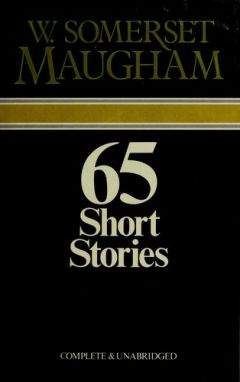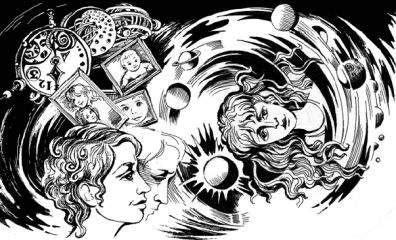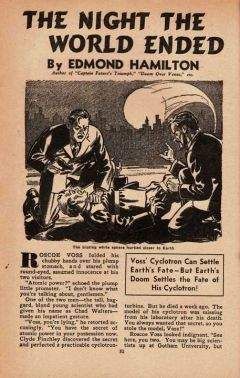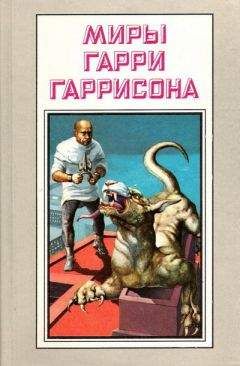Somerset Maugham - Sixty-Five Short Stories

Скачивание начинается... Если скачивание не началось автоматически, пожалуйста нажмите на эту ссылку.
Жалоба
Напишите нам, и мы в срочном порядке примем меры.
Описание книги "Sixty-Five Short Stories"
Описание и краткое содержание "Sixty-Five Short Stories" читать бесплатно онлайн.
'I hope I'm not making myself too great a nuisance,' he said. 'I think I shall be well enough to make a move tomorrow or the day after.'
'It's not often we see anybody in a place like this, you know. It's a treat to have someone to talk to.'
'Won't you sit down? I'll tell my boy to bring you a chair.'
'Norman said I was to leave you alone.'
'I haven't spoken to a white person for two years. I've been longing for a good old talk.'
Her head twitched violently, more quickly than usual, and her hand gave that queer spasmodic gesture.
'He won't be back for another hour. I'll get a chair.'
Skelton told her who he was and what he had been doing, but he discovered that she had questioned his boy and already knew all about him.
'You must be crazy to get back to England?' she asked.
'I shan't be sorry.'
Suddenly Mrs Grange seemed to be attacked by what one could only describe as a nerve storm. Her head twitched so madly, her hand shook with such fury, that it was disconcerting. You could only look away.
'I haven't been to England for sixteen years,' she said.
'You don't mean that? Why, I thought all you planters went home every five years at the longest.'
'We can't afford it; we're broke to the wide. Norman put all the money he had into this plantation, and it hasn't really paid for years. It only just brings in enough to keep us from starvation. Of course it doesn't matter to Norman. He isn't English really.'
'He looks English enough.'
'He was born in Sarawak. His father was in the government service. If he's anything he's a native of Borneo.'
Then, without warning, she began to cry. It was horribly painful to see the tears running down the raddled, painted cheeks of that woman with the constant tic. Skelton knew neither what to say nor what to do. He did what was probably the best thing, he kept silent. She dried her eyes.
'You must think me a silly old fool. I sometimes wonder that after all these years I can still cry. I suppose it's in my nature. I always could cry very easy when I was on the stage.'
'Oh, were you on the stage?'
'Yes, before I married. That's how I met Norman. We were playing in Singapore and he was there on holiday. I don't suppose I shall ever see England any more. I shall stay here till I die and every day of my life I shall look at that beastly river. I shall never get away now. Never.'
'How did you happen to find yourself in Singapore?'
'Well, it was soon after the war, I couldn't get anything to suit me in London, I'd been on the stage a good many years and I was fed up with playing small parts: the agents told me a fellow called Victor Palace was taking a company out East. His wife was playing lead, but I could play seconds. They'd got half a dozen plays, comedies, you know, and farces. The salary wasn't much, but they were going to Egypt and India, the Malay States and China and then down to Australia. It was a chance to see the world and I accepted. We didn't do badly in Cairo and I think we made money in India, but Burma wasn't much good, and Siam was worse; Penang was a disaster and so were the rest of the Malay States. Well, one day Victor called us together and said he was bust, he hadn't got the money for our fares to Hong Kong, and the tour was a wash-out and he was very sorry but we'd have to get back home as best we could. Of course we told him he couldn't do that to us. You never heard such a row. Well, the long and short of it was that he said we could have the scenery and the props if we thought they was any good to us, but as to money it was no use asking for it because he damned well hadn't got it. And next day we found out that him and his wife, without saying a word to anybody, had got on a French boat and skipped. I was in a rare state, I can tell you. I had a few pounds I'd saved out of me salary, and that was all; somebody told me if we was absolutely stranded the government would have to send us home, but only steerage, and I didn't much fancy that. We got the Press to put our plight before the public and someone came along with the proposition that we should give a benefit performance. Well, we did, but it wasn't much without Victor or his wife, and by the time we'd paid the expenses we weren't any better off than we'd been before. I was at my wits' end, I don't mind telling you. It was then that Norman proposed to me. The funny thing is that I hardly knew him. He'd taken me for a drive round the island and we'd had tea two or three times at the Europe and danced. Men don't often do things for you without wanting something in return, and I thought he expected to get a little bit of fun, but I'd had a good deal of experience and I thought he'd be clever if he got round me. But when he asked me to marry him, well, I was so surprised, I couldn't hardly believe me own ears. He said he'd got his own estate in Borneo and it only wanted a little patience and he'd make a packet. And it was on the banks of a fine river and all round was the jungle. He made it sound very romantic. I was getting on, you know, I was thirty, it wasn't going to be any easier to get work as time went on, and it was tempting to have a house of me own and all that. Never to have to hang around agents' offices no more. Never to have to lay awake no more and wonder how you was going to pay next week's rent. He wasn't a bad-looking chap in those days, brown and big and virile. No one could say I was willing to marry anybody just to . . .' Suddenly she stopped. 'There he is. Don't say you've seen me.'
She picked up the chair she had been sitting in and quickly slipped away with it into the house. Skelton was bewildered. Her grotesque appearance, the painful tears, her story told with that incessant twitching; and then her obvious fear when she heard her husband's voice in the compound, and her hurried escape; he could make nothing of it.
In a few minutes Norman Grange stumped along the veranda.
'I hear you're better,' he said.
'Much, thanks.'
'If you care to join us at brunch I'll have a place laid for you.'
'I'd like it very much.'
'All right. I'm just going to have a bath and a change.'
He walked away. Presently a boy came along and told Skelton his tuan was waiting for him. Skelton followed him into a small sitting-room, with the jalousies drawn to keep out the heat, an uncomfortable, overcrowded room with a medley of furniture, English and Chinese, and occasional tables littered with worthless junk. It was neither cosy nor cool. Grange had changed into a sarong and baju and in the native dress looked coarse but powerful. He introduced Skelton to his wife. She shook hands with him as though she had never seen him before and uttered a few polite words of greeting. The boy announced that their meal was ready and they went into the dining-room.
'I hear that you've been in this bloody country for some time,' said Grange.
'Two years. I'm an anthropologist and I wanted to study the manners and customs of tribes that haven't had any contact with civilization.'
Skelton felt that he should tell his host how it had come about that he had been forced to accept a hospitality which he could not but feel was grudgingly offered. After leaving the village that had been his headquarters he had journeyed by land for ten days till he reached the river. There he had engaged a couple of prahus, one for himself and his luggage and the other for Kong, his Chinese servant, and the camp equipment, to take him to the coast. The long trek across country had been hard going and he found it very comfortable to lie on a mattress under an awning of rattan matting and take his ease. All the time he had been away Skelton had been in perfect health, and as he travelled down the river he could not but think that he was very lucky; but even as the thought passed through his mind, it occurred to him that if he happened just then to congratulate himself on his good fortune in this respect, it was because he did not feel quite so well as usual. It was true that he had been forced to drink a great deal of arak the night before at the long-house where he had put up, but he was used to it and that hardly accounted for his headache. He had a general sense of malaise. He was wearing nothing but shorts and a singlet, and he felt chilly; it was curious because the sun was shining fiercely and when he put his hand on the gunwale of the prahu the heat was hardly bearable. If he had had a coat handy he would have put it on. He grew colder and colder and presently his teeth began to chatter; he huddled up on his mattress, shivering all over in a desperate effort to get warm. He could not fail to guess what was the matter.
'Christ,' he groaned. 'Malaria.'
He called the headman, who was steering the prahu.
'Get Kong.'
The headman shouted to the second prahu and ordered his own paddlers to stop. In a moment the two boats were side by side and Kong stepped in.
'I've got fever, Kong,' gasped Skelton. 'Get me the medicine chest and, for God's sake, blankets. I'm freezing to death.'
Kong gave his master a big dose of quinine and piled on him what coverings they had. They started off again.
Skelton was too ill to be taken ashore when they tied up for the night and so passed it in the prahu. All next day and the day after he was very ill. Sometimes one or other of the crew came and looked at him, and often the headman stayed for quite a long while staring at him thoughtfully.
'How many days to the coast?' Skelton asked the boy.
'Four, five.' He paused for a minute. 'Headman, he no go coast. He say, he wantchee go home.'
'Tell him to go to hell.'
'Headman say, you velly sick, you die. If you die and he go coast he catchee trouble.'
'I'm not thinking of dying,' said Skelton. 'I shall be all right. It's just an ordinary go of malaria.'
Kong did not answer. The silence irritated Skelton. He knew that the Chinese had something in mind that he did not like to say.
'Spit it out, you fool,' he cried.
Skelton's heart sank when Kong told him the truth. When they reached their resting-place that night the headman was going to demand his money and slip away with the two prahus before dawn. He was too frightened to carry a dying man farther. Skelton had no strength to take the determined attitude that might have availed him; he could only hope by the offer of more money to persuade the headman to carry out his agreement. The day passed in long arguments between Kong and the headman, but when they tied up for the night the headman came to Skelton and told him sulkily that he would go no farther. There was a long-house near by where he might get lodging till he grew better. He began to unload the baggage. Skelton refused to move. He got Kong to give him his revolver and swore to shoot anyone who came near him.
Kong, the crew, and the headman went up to the long-house and Skelton was left alone. Hour after hour he lay there, the fever burning his body and his mouth parched, while muddled thoughts hammered away in his brain. Then there were lights and the sound of men talking. The Chinese boy came with the headman and another man, whom Skelton had not yet seen, from the neighbouring long-house. He did his best to understand what Kong was telling him. It appeared that a few hours down-stream there lived a white man, and to his house, if that would satisfy Skelton, the headman was willing to take him.
'More better you say yes,' said Kong. 'Maybe white man has launch, then we go down to coast chop-chop.'
'Who is he?'
'Planter,' said Kong. 'This fellow say, him have rubber estate.'
Skelton was too tired to argue further. All he wanted just then was to sleep. He accepted the compromise.
'To tell you the truth,' he finished, 'I don't remember much more till I woke up yesterday morning to find myself an uninvited guest in your house.'
'I don't blame those Dyaks, you know,' said Grange. 'When I came down to the prahu and saw you, I thought you were for it.'
Mrs Grange sat silent while Skelton told his story, her head and her hand twitching regularly, as though by the action of some invisible clockwork, but when her husband addressed her, asking for the Worcester Sauce, and that was the only time he spoke to her, she was seized with such a paroxysm of involuntary movement that it was horrible to see. She passed him what he asked for without a word. Skelton got an uncomfortable impression that she was terrified of Grange. It was odd, because to all appearance he was not a bad sort. He was knowledgeable and far from stupid; and though you could not have said that his manner was cordial, it was plain that he was ready to be of what service he could.
They finished their meal and separated to rest through the heat of the day.
'See you again at six for a sun-downer,' said Grange.
When Skelton had had a good sleep, a bath, and a read, he went out on to the veranda. Mrs Grange came up to him. It looked as though she had been waiting.
'He's back from the office. Don't think it's funny if I don't speak to you. If he thought I liked having you here he'd turn you out tomorrow.'
She said these words in a whisper and slipped back into the house. Skelton was startled. It was a strange house he had come into in a strange manner. He went into the overcrowded sitting-room and there found his host. He had been worried by the evident poverty of the establishment and he felt that the Granges could ill afford even the small expense he must be putting them to. But he had already formed the impression that Grange was a quick-tempered, susceptible man and he did not know how he would take an offer to help. He made up his mind to risk it.
'Look here,' he said to him, 'it looks as though I might have to inflict myself on you for several days. I'd be so much more comfortable if you'd let me pay for my board and lodging.'
'Oh, that's all right, your lodging costs nothing, the house belongs to the mortgagees, and your board doesn't come to much.'
'Well, there are drinks anyway and I've had to come down on your stores of tobacco and cigarettes.'
'It's not more than once a year that anyone comes up here, and then it's only the D.O. or someone like that-besides, when one's as broke as I am nothing matters much.'
'Well, then, will you take my camp equipment? I shan't be wanting it any more, and if you'd like one of my guns, I'd be only too glad to leave it with you.'
Grange hesitated. There was a glimmer of cupidity in those small, cunning eyes of his.
'If you'd let me have one of your guns you'd pay for your board and lodging over and over again.'
'That's settled, then.'
They began to talk over the whisky and sparkler with which, following the Eastern habit, they celebrated the setting of the sun. Discovering that they both played chess they had a game. Mrs Grange did not join them till dinner. The meal was dull. An insipid soup, a tasteless river fish, a tough piece of steak, and a caramel pudding. Norman Grange and Skelton drank beer; Mrs Grange water. She never of her own will uttered a word. Skelton had again the uncomfortable impression that she was scared to death of her husband. Once or twice, Skelton from common politeness sought to bring her into the conversation, addressing himself to her, telling her a story or asking her a question, but it evidently distressed her so much, her head twitched so violently, her hand was agitated by gestures so spasmodic that he thought it kinder not to insist. When the meal was over she got up. 'I'll leave you gentlemen to your port,' she said.
Подписывайтесь на наши страницы в социальных сетях.
Будьте в курсе последних книжных новинок, комментируйте, обсуждайте. Мы ждём Вас!
Похожие книги на "Sixty-Five Short Stories"
Книги похожие на "Sixty-Five Short Stories" читать онлайн или скачать бесплатно полные версии.
Мы рекомендуем Вам зарегистрироваться либо войти на сайт под своим именем.
Отзывы о "Somerset Maugham - Sixty-Five Short Stories"
Отзывы читателей о книге "Sixty-Five Short Stories", комментарии и мнения людей о произведении.














